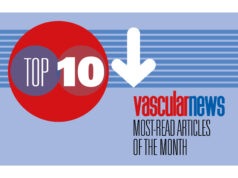 Firas Mussa (Houston, USA) urges specialists to put biases aside when it comes to treatment options for uncomplicated type B aortic dissection (TBAD).
Firas Mussa (Houston, USA) urges specialists to put biases aside when it comes to treatment options for uncomplicated type B aortic dissection (TBAD).
Surgeons in general and vascular surgeons in particular have not been at the forefront of generating evidence. We have debated about asymptomatic carotid disease, claudication, and most recently on what to do with patients with uncomplicated TBAD without doing much research on any of them. Some are even debating the definition of uncomplicated TBAD and offer a stent graft to almost all comers. None of these debates have been based on high-quality data. Besides biases and/or conflicts, I am not sure how to characterise the craze to push for one treatment over the other.
In 2023, the US National Heart, Lung, and Blood Institute (NHLBI) funded the IMPROVE-AD trial. This was the culmination of a decade-long effort built on clinical equipoise and led by a team that has a track record in clinical trials. The first patient was enrolled in April 2024 with lukewarm enthusiasm from sites. The hurdles are not too dissimilar to those faced by other NHLBI-funded trials in the past but unique to this disease is the widespread belief that we have all the data we need to offer stents to almost all patients. The risk to science is real, especially with societal guidelines adopting a copy/paste approach to other published documents, upgrading the level of recommendation (from 2b to 2a) without new evidence. In other words, guidelines have lost credibility to independently evaluate data with nuance and/or accuracy.
To move forward, investigators from around the world have the moral obligation to patients and the scientific responsibility to their respective societies to do better. We all need to put our biases aside, move more towards the centre and enrol patients in clinical trials. The traditional rate of one out of four patients approached/consented is still true, but not attempting is unacceptable. We are privileged to care for our patients and offering what is in their best interest is expected.
When it comes to uncomplicated TBAD, we have two treatment modalities that are ‘good enough’. However, we do not know which is best, and among many other questions; we do not know the impact of ‘high-risk’ features, ideal timing of intervention, length of coverage, what patients want and at what cost. Therefore, enrolling in the ongoing trials—IMPROVE-AD, EARNEST and SUNDAY—is in the best interest of all patients, present and future.
Firas Mussa is professor of surgery at The University of Texas Health Science Center at Houston (UTHealth Houston) in the USA, and principal investigator and co-chair of the executive committee for the IMPROVE-AD trial.













